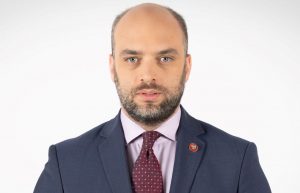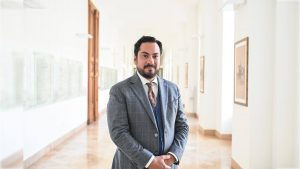The Ludovika Ambassadors’ Forum jointly organized by the Regional Cooperation Department of the Ludovika University of Public Service (LUPS) and the Embassy of the Republic of Latvia in Budapest, took place on May 6 in the St. Ladislaus Chapel under the title of Latvia’s foreign policy priorities.
First, Iván Gyurcsík, regional advisor to the rector of LUPS and head of the Minority Policy Research Group, greeted the audience: “Our university pays special attention to cultivating regional relations in Central and Eastern Europe. Since fall of 2022, ambassadors of seven countries have honoured our institution with their presence: Czech Republic, Poland, Turkey, Croatia, Bulgaria, Albania and Georgia,” he recalled. He added: Latvia and Hungary are actively cooperating in NATO and the European Union, among other things, in the fields of economy, defence, education and tourism. As for bilateral academic partnership, LUPS maintains close relations with the University of Latvia. “In this context, in recent years we have hosted three Latvian university staff members, while one of our colleagues visited a Latvian higher education institution. This academic year, two of our students spent a semester in Latvia, and at the end of April we hosted a Latvian professor as part of the Ludovika Scholars Program,” the rector’s advisor listed the details of the cooperation.
Afterwards, Judit Galambos, chief advisor of the Regional Cooperation Department, introduced the guest of the evening. Jurijs Pogrebņaks, Ambassador of Latvia to Hungary, took up his office in Budapest in September 2024. In addition to Hungary, he is also accredited ambassador to Slovenia, Croatia and Montenegro. He graduated from the University of Latvia with a degree in history and philosophy. Later, he delved into the topics of security policy and international crisis management – for example, at the George C. Marshall Centre for Security Studies in Germany and the Geneva Centre for Security Policy in Switzerland.
Gaining independence
Next, H.E. Jurijs Pogrebņaks, Ambassador of Latvia, gave a keynote speech of his country’s foreign policy. In it, he first mentioned the animated promotion film Flow, which – as Latvia’s most successful film work to date – has won more than 70 international awards, including the Golden Globe, the César and the Oscar awards. The key to the success was the close cooperation with Belgian and French partners, the ambassador underlined. Then he recalled the main historical milestones leading up to this, from the founding of the Latvian state through the two world wars and the Soviet occupation to the gaining of freedom and independence. “A few days ago, on May 4, we celebrated the 34th anniversary of the adoption of the Declaration of Independence of the Republic of Latvia. In January 1991, we took to the streets of Riga to set up barricades and gain our independence from the occupying power.
“We also remember the resistance and scepticism that the Baltic states faced when they sought to restore their independence. We were told to wait. Let’s not provoke unnecessarily, because it could even lead to nuclear war. A defining historical memory for us is the so-called ‘prison yard peace’, which brought 50 years of Soviet occupation to Latvia, with thousands of victims in KGB prisons and Siberian gulags,” the ambassador said.
Thanks to the Hungarians
The ambassador outlined Latvia’s foreign policy priorities in three points. The first is to ensure security and defence; the second is to promote economic development and prosperity, the EU’s competitiveness and global influence; and the third is to protect the interests of Latvian citizens, involve the public in the development and implementation of foreign policy, and exploit the potential of the significant Latvian diaspora. Of these, security is now the most important, as it is the basis for growth. In this spirit, they plan to spend 4% this year and 5 % of GDP next year to defence and security investment, he added. He thanked Canada for its leading role in the NATO brigade stationed in Latvia. This organization consists of about 4,000 soldiers from 14 allied nations. “We would like to express our special thanks to our Hungarian allies for their regular participation in NATO’s Baltic Air Policing Mission, which will arrive to the Baltics for the fourth time in the second half of this year, again with Gripen fighter jets,” said Jurijs Pogrebņaks.
In his speech, the ambassador touched upon the conflicts taking place in the world, as well as the conditions for economic and global economic growth. According to him, we have reached a historical crossroads: the world order as we know it is facing serious challenges. The world order based on the UN Charter, which prohibits aggression against other countries, is under attack. Based on Article 51 of the UN Charter, Ukraine exercises its right to self-defence against armed attack. Latvia has concluded a bilateral agreement with Ukraine, in which it will provide continuous military aid amounting to 0.25% of its own GDP for the next two years, and will support the reconstruction of the country.
Latvia’s priorities in relation to the EU budget are security and defence, cohesion policy, the common agricultural policy and the financing of the Rail Baltica project. The country supports an increase in the overall EU budget in order to ensure the financing of both traditional and new priorities, the ambassador stressed
What protects and what preserves
The presentation was followed by a roundtable discussion, in which Ambassador Jurijs Pogrebņaks and Krisztián Manzinger, Commissioned Head of the Department of International Law, Faculty of Political Science and Law, Károli Gáspár Reformed University, exchanged views, moderated by Iván Gyurcsík. The discussion focused on the Baltic Way, a human chain organized by the three Baltic countries in 1989, which marked a turning point in the independence aspirations of the states in the region. In this regard, the ambassador emphasized that his country has always been able to preserve its culture throughout its turbulent history.
“This is what kept us going,” he said. In connection with the Russian-Ukrainian war, the introduction of compulsory military service and increased defence spending were discussed, and then the ambassador spoke about the establishment of the Baltic Council of Ministers. In addition to coordinating security policy issues, an important element of cooperation is also energy independence from the Russia. Since January 2025, Latvia has been fully connected to the European electricity grid and earlier, in 2023, Latvia became independent of Russian pipeline gas supplies, and has since completely replaced it with LNG gas. The fence currently being built on the Latvian-Belarusian-Russian border was also discussed – this was approved by the European Commission years ago for security reasons, given Latvia’s special geographical location.
Pillars
Krisztián Manzinger explained that the Latvian diaspora is proportionally larger than the Hungarian diaspora abroad. While in our country, contacts with these groups usually takes place between states, Latvia is characterized by the fact that they try to connect people themselves. For example, Latvians working in international organizations have a network, who meet from time to time at professional forums to exchange experiences, these occasions are stable pillars of Latvian diaspora policy. Calling back citizens who have left their homeland is not easy for any country, the expert indicated, but we can learn from the Latvians in this area.
The experts also illustrated the numerical development of minorities living in Latvia in a graph over the past hundred years. The data pointed to the impact of the strong Sovietization policy, as a result of which the proportion of Germans and Jews decreased to a minimum, while the proportion of Russians increased significantly. This process lasted until independence, and in the meantime two generations grew up in a country where only Russian and Latvian could be studied. In the first years of independence, the situation changed: the use of minority languages were restored, and the teaching of an EU language became mandatory in schools. For today’s Latvian youth, English is now a natural medium, and in addition, they also learn a freely chosen other language.



